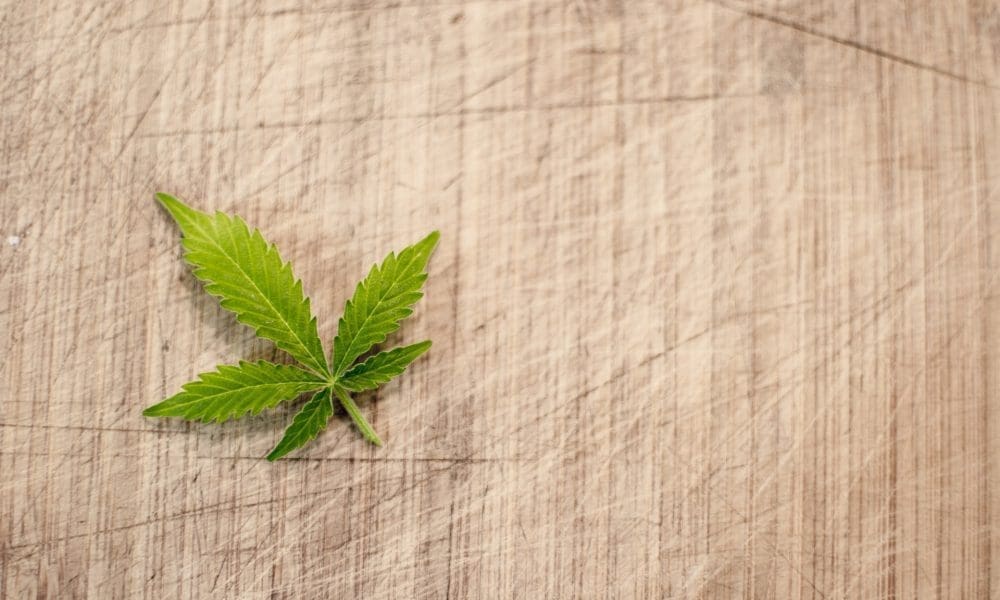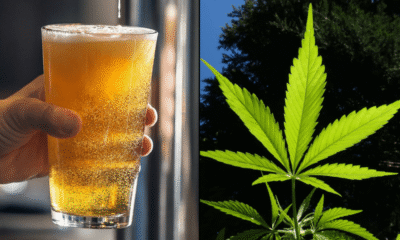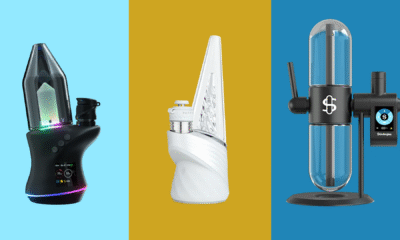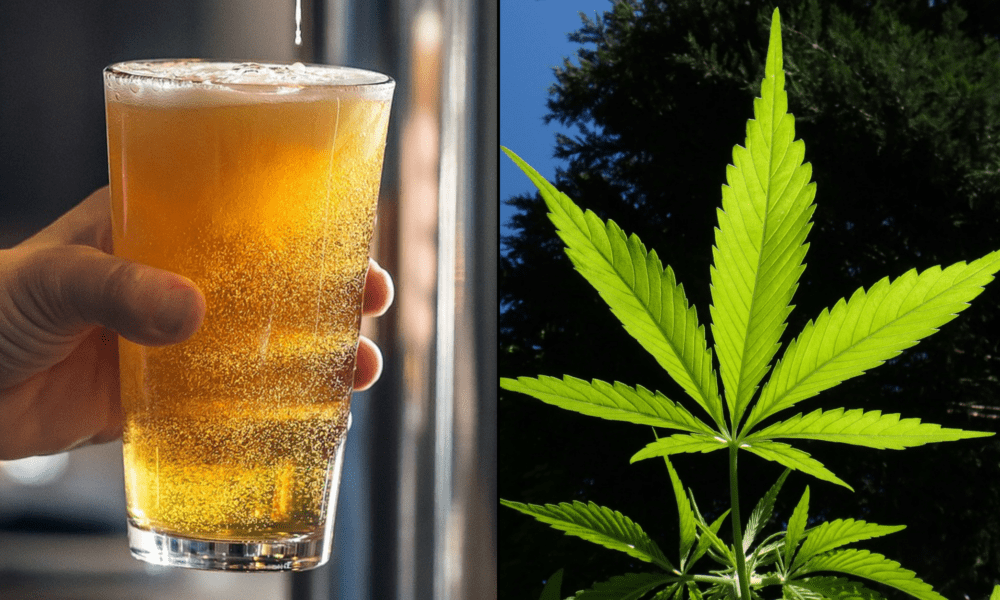featured
Delaware Lawmaker Withdraws Bill To Regulate Hemp-Derived THC Drinks
Published
8 hours agoon

“I just feel like we didn’t have enough time left to make sure everybody felt comfortable with the bill.”
By Briana Hill, Spotlight Delaware
Delaware’s unregulated market of hemp-derived THC products will remain unchecked for now, as lawmakers pull back on a bill that would have created policy around where and how THC-infused drinks could be sold.
Late last week, Rep. Debra Heffernan (D-Bellefonte) announced in a Facebook post that she is tabling a bill that would have taken beverages infused with tetrahydrocannabinol (THC), the compound responsible for the “high” in marijuana, and regulated them exclusively through Delaware’s three-tier alcohol system.
The bill would have prohibited the sale of such drinks in any gas station, smoke shop, convenience store or hemp shop that currently sells them.
Heffernan’s move to stall the bill comes amid weeks of debate between liquor store operators and hemp businesses owners, who have both argued that having the ability to sell the products would make or break their businesses.
THC-infused products have become popular in such stores since the passage of the 2018 U.S. Farm Bill, which created a loophole allowing for the legal commercial and retail sale of hemp-derived substances.
Hemp is legally defined as a non-intoxicating cannabis plant that contains 0.3 percent or less THC by dry weight. But entrepreneurial hemp farmers have figured out a way to chemically convert the non-intoxicating compound cannabidiol (CBD) from hemp into intoxicating substances like delta-9 and delta-8 THC. It’s technically legal as long as the hemp at time of harvest stays below legal thresholds.
‘Not enough time left’
Heffernan decided to put the measure on hold, saying that she didn’t feel like there was enough time to get the beverage bill completed considering the concerns that arose from retailers who still wanted to be able to sell the products.
“I just feel like we didn’t have enough time left to make sure everybody felt comfortable with the bill,” Heffernan told Spotlight Delaware.
She also wants to be able to gain more input from Delaware’s new marijuana commissioner, Joshua Sanderlin.
Sanderlin, who was appointed to the role on May 14, told Spotlight Delaware that his primary goal regarding the illicit market is to establish regulations for hemp products, since there is currently no oversight at all.
He affirmed that the marijuana industry is equipped to regulate hemp products, but when asked if he would consider putting hemp stores into Delaware’s regulated marijuana industry so that they can continue to sell their products, he said it was an “early question.”
Now that the bill has been stalled, liquor stores can still sell THC-infused beverages, just without the proposed regulations or the 50-cent tax per 12-ounce can that would have been implemented under the legislation.
Edward Mulvihill, president of the Delaware Small Beverage License Council and Director of Sales & Marketing at Peco’s Liquor Store, says liquor businesses will continue to operate in a “gray area,” but he hopes to see clear regulations soon that define what these beverages are and how they should be taxed and sold.
Hemp and CBD shops will also see some temporary relief with the measure being paused. Jena Murray, president of the U.S Hemp Roundtable, which represents various hemp companies both in and out of state, noted that she and other advocates will continue to push for policy in Delaware that is inclusive to hemp and CBD businesses that have already been selling hemp-derived THC consumable products.
But with both proposals on hold, and potential regulation around THC products being stalled until next year, it is unclear how the lack of enforcement will continue to burden the state.
It is also whether state officials will have to provide more resources to crack down on shops that are selling illegal products.
Hemp products becoming more popular
The widespread sale of the products in Delaware has increased over the past few years, raising concerns among state officials, who have noted an increase in reports of underage consumption and the use of harmful chemicals in the products.
The Delaware Department of Alcohol and Tobacco Enforcement, which has currently been keeping track of the unregulated market, did not respond to a request for comment on Monday.
Early last month, Heffernan introduced a larger measure to tackle the unregulated market, which, in addition to regulating THC beverages through the state’s alcohol establishments, would have placed hemp-derived THC edibles like gummies, chocolates, smokable flower, and oils under the purview of Delaware’s marijuana industry.
The original bill was met with backlash from hemp and CBD store operators, who said that the bill would take all of the products off their shelves and force them to close their businesses.
But those within the alcohol industry said that the bill was coming at a convenient time considering that many liquor stores statewide have been experiencing a decline in revenue over the past two years.
Last month during the House Economic Development/Banking/Insurance & Commerce Committee hearing, co-founder of Universal Beverage Importers, Jason Giuliano, noted that THC-infused beverages could make up to 20% in liquor store sales.
But about a month after the original measure was introduced, Heffernan divided the proposal into two bills, with the goal of only move forward this legislative session with the measure that would regulate THC drinks, noting that the beverage bill had more “agreement on the path forward.”
She said she would talk with more stakeholders over the summer before finalizing the second bill that would regulate other edible THC products, with hopes of having something to file in January.
This story was first published by Spotlight Delaware.
CBD From Cannabis Could Help Reduce Alcohol Binge Drinking, Study Shows

Author: mscannabiz.com
MScannaBIZ for all you Mississippi Cannabis News and Information.
You may like
-


CBD From Cannabis Could Help Reduce Alcohol Binge Drinking, Study Shows
-


Gen Z Is Ditching Relationship Labels While Millennials
-


Florida Lawmakers Pass Bill To Revoke Medical Marijuana Cards From People With Drug Convictions, Sending It To DeSantis’s Desk
-


North Carolina Lawmakers Advance Bill To Regulate Hemp THC Products And Restrict Kratom
-


Alaska Activists Launch Campaign To Put Psychedelics Legalization Measure On 2026 Ballot
-


Best dab rigs of 2025 by Leafly
featured
CBD From Cannabis Could Help Reduce Alcohol Binge Drinking, Study Shows
Published
16 minutes agoon
June 18, 2025
The cannabinoid CBD reduces rates of binge drinking and alcohol blood concentrations, a new study of mice indicates.
Using what they called a “murine drinking-in-the-dark” research model, scientists at the University of Sydney investigated the theory that non-intoxicating cannabidiol could mitigate problematic drinking issues.
“These experiments consistently showed a dose-dependent suppression of alcohol consumption by CBD,” the paper concludes. “The efficacy of acute CBD persisted for several months, was maintained during sub-chronic administration and was not associated with locomotor impairments.”
The study, published in the journal British Journal of Pharmacology with funding from the Australian National Health and Medical Research Council, found that “CBD represents a promising candidate to reduce voluntary alcohol consumption.”
“Mechanisms driving CBD’s alcohol-related effects remain unclear and may involve polypharmacology, including actions at the [neuropeptide S receptor] identified in the present study,” researchers said.
“The present findings showed a clear, dose-dependent inhibition by CBD of binge-like ethanol consumption in male and female mice. This effect was supported by [blood ethanol concentration] data and could not be attributed to sedation, because CBD did not alter locomotor activity. CBD suppressed drinking with acute administration, and the effect was maintained when CBD was administered sub-chronically, indicating the effect was not subject to tolerance.”
“CBD presents as a promising novel pharmacotherapy for problematic alcohol use; however, how CBD generates alcohol-related benefits is yet to be determined,” the study says. “Unravelling CBD’s mechanisms may direct the development of safer, more effective [alcohol use disorder] therapeutics.”
Results of a separate study published in the journal Molecular Psychiatry also indicated that a single, 800-milligram dose of CBD can help manage certain alcohol cravings among people with alcohol use disorder (AUD), supporting the use of the marijuana component as a potential treatment option for problem drinkers.
Federally funded research into the effects of cannabis on alcohol use that was published last month also found that people who used marijuana immediately before drinking subsequently consumed fewer alcoholic beverages and reported lower cravings for alcohol.
The study follows a separate survey analysis published in March that found that three in four young adults reported substituting cannabis for alcohol at least once per week—a “fast-emerging” trend that reflects the “rapid expansion” of the hemp product marketplace.
The report from Bloomberg Intelligence (BI) found that, across various demographics, cannabis is increasingly being used as an alternative to alcohol and even non-alcoholic beverages as more companies—including major multi-state marijuana operators (MSOs)—expand their offerings.
The findings were largely consist with a growing body of studies indicating that cannabis—whether federally legal hemp or still-prohibited marijuana—is being utilized as a substitute for many Americans amid the reform movement.
An earlier survey from YouGov, for example, found that a majority of Americans believe regular alcohol consumption is more harmful than regular marijuana use. Even so, more adults said they personally prefer drinking alcohol to consuming cannabis despite the health risks.
A separate poll released in January determined that more than half of marijuana consumers say they drink less alcohol, or none at all, after using cannabis.
Yet another survey—which was supported by the National Institute on Drug Abuse (NIDA) and released in December—found that young adults are nearly three times more likely to use marijuana than alcohol on a daily or near-daily basis.
That poll provided more granular, age-specific findings than a similar report published last year, finding that more Americans overall smoke marijuana on a daily basis than drink alcohol every day—and that alcohol drinkers are more likely to say they would benefit from limiting their use than cannabis consumers are.
A separate study published in the journal Addiction last year similarly found that there are more U.S. adults who use marijuana daily than who drink alcohol every day.
In December, BI also published the results of a survey indicating that substitution of cannabis for alcohol is “soaring” as the state-level legalization movement expands and relative perceptions of harm shift. A significant portion of Americans also said in that poll that they substitute marijuana for cigarettes and painkillers.
Another BI analysis from last September projected that the expansion of the marijuana legalization movement will continue to post a “significant threat” to the alcohol industry, citing survey data that suggests more people are using cannabis as a substitute for alcoholic beverages such a beer and wine.
Yet another study on the impact of marijuana consumption on people’s use of other drugs that was released in December suggested that, for many, cannabis may act as a less-dangerous substitute, allowing people to reduce their intake of substances such as alcohol, methamphetamine and opioids like morphine.
A study out of Canada, where marijuana is federally legal, found that legalization was “associated with a decline in beer sales,” suggesting a substitution effect.
The analyses comport with other recent survey data that more broadly looked at American views on marijuana versus alcohol. For example, a Gallup survey found that respondents view cannabis as less harmful than alcohol, tobacco and nicotine vapes—and more adults now smoke cannabis than smoke cigarettes.
A separate survey released by the American Psychiatric Association (APA) and Morning Consult last June also found that Americans consider marijuana to be significantly less dangerous than cigarettes, alcohol and opioids—and they say cannabis is less addictive than each of those substances, as well as technology.
Meanwhile, a leading alcohol industry association is calling on Congress to dial back language in a House committee-approved spending bill that would ban most consumable hemp products, instead proposing to maintain the legalization of naturally derived cannabinoids from the crop and only prohibit synthetic items.

Author: mscannabiz.com
MScannaBIZ for all you Mississippi Cannabis News and Information.
featured
Gen Z Is Ditching Relationship Labels While Millennials
Published
1 hour agoon
June 17, 2025
The growing popularity of situationships is changing how we define love, commitment, and emotional intimacy.
Gen Z is ditching relationship labels while millennials, they are conflicted. The groups are changing how we define love and commitment.In a world where ghosting is easier than a breakup and therapy-speak dominates TikTok, more young adults are choosing “situationships” over traditional relationships. But is this modern love style freeing or just confusing?
For Gen Z and Millennials, the term “situationship” has become a defining relationship status — not quite single, not fully committed, and often without a clear endpoint. Unlike casual hookups of the past, situationship
RELATED: 5 Ways Microdosing Cannabis Can Boost Work Performance
According to a 2024 study by Hinge, 67% of Gen Z users said they’ve been in at least one situationship in the last year. Millennials aren’t far behind. Many say it offers freedom and flexibility, especially in a dating culture shaped by mental health awareness, financial uncertainty, and a post-pandemic shift in priorities.

But that freedom comes with a cost.
“Situationships can feel safe because there’s no pressure, but they also leave people emotionally confused,” says Dr. Maya Collins, a relationship therapist based in Los Angeles. “You’re investing time and emotions without knowing where it’s going.”
For Gen Z, who often value emotional nuance and resist traditional binaries, the situationship can feel aligned with broader social values — autonomy, exploration, and authenticity. Meanwhile, older Millennials, many of whom are navigating fertility timelines or recovering from divorce, often find themselves torn between the appeal of low-pressure intimacy and the need for clarity.
RELATED: Cannabis Is Way Better And Safer Than A Honey Pack
Social media has only amplified the trend. Platforms like TikTok and Instagram are flooded with memes, breakup stories, and “therapy talk” about attachment styles, emotional unavailability, and breadcrumbing — all of which fuel both the popularity and the pitfalls of situationships.
So, is this a generational fear of commitment — or are we just rewriting the rules of love?
Maybe both.
As romantic norms continue to evolve, one thing is clear: communication is key. Whether you’re vibing with someone casually or looking for a long-term partner, defining the relationship — even if just for the moment — is the healthiest move.

Author: mscannabiz.com
MScannaBIZ for all you Mississippi Cannabis News and Information.
featured
Florida Lawmakers Pass Bill To Revoke Medical Marijuana Cards From People With Drug Convictions, Sending It To DeSantis’s Desk
Published
2 hours agoon
June 17, 2025
Lawmakers in Florida are sending legislation to the governor’s desk that would revoke state medical marijuana registrations of people convicted of certain drug crimes.
On Monday, both the House and Senate signed off on a compromise version of SB 2514, a broad bill that touches on cancer, dentistry and other health-related matters. It also contains a provision that would force the state Department of Health (DOH) to cancel registrations of medical marijuana patients and caregivers if they’re convicted or plead either guilty or no contest to criminal drug charges.
On Monday, both legislative chambers approved a compromise committee’s revised version of the bill and sent the measure to Gov. Ron DeSantis (R).
Language in the latest version is slightly different than what the Senate approved earlier this year. It says that a patient or caregiver would have their registration immediately suspended upon being charged with a state drug crime. The suspension would remain in place until the criminal case reaches a final disposition.
DOH officials would have authority to reinstate the registration, revoke it entirely or extend the suspension if needed.
Authorities would be required to revoke a person’s registration if the patient or caregiver “was convicted of, or pled guilty or nolo contendre to, regardless of adjudication, a violation [of state drug law] if such violation was for trafficking in, the sale, manufacture, or delivery of, or possession with intent to sell, manufacture, or deliver a controlled substance.”
The revised language appears to eliminate an earlier restriction that would have also revoked registrations for people who merely purchased illegal drugs, including more than 10 grams of marijuana for their own use. The new version focuses more specifically on production and distribution.
It also clarifies that patients and caregivers would have a process to request their registrations be reinstated. That would involve submitting a new application “accompanied by a notarized attestation by the applicant that he or she has completed all the terms of incarceration, probation, community control, or supervision related to the offense.”
It’s not clear from the plain language of the revised bill whether it would impact only future criminal cases involving medical marijuana patients and caregivers or whether DOH would need to review the records of existing program registrants and revoke registrations of an untold number of Floridians with past drug convictions.
Notably, lawmakers defeated several proposals to expand the medical cannabis program during this year’s regular legislation session—including by allowing home cultivation, adding new qualifying conditions, protecting employment and parental rights of patients and letting military veterans register for free.
Separately in Florida, advocates are working toward putting a new adult-use marijuana legalization measure on the 2026 state ballot following the failure of Amendment 3 at the polls last November.
After filing the measure and launching a signature drive earlier this year, the campaign Smart & Safe Florida has collected 377,832 valid signatures—about 150,000 more than required to kick off the review process, according to Division of Elections numbers from earlier this month.
The state is now statutorily obligated to conduct a judicial and financial review of the measure that will determine its legal eligibility and inform the electorate about its potential economic impact.
—
Marijuana Moment is tracking hundreds of cannabis, psychedelics and drug policy bills in state legislatures and Congress this year. Patreon supporters pledging at least $25/month get access to our interactive maps, charts and hearing calendar so they don’t miss any developments.![]()
Learn more about our marijuana bill tracker and become a supporter on Patreon to get access.
—
Smart & Safe Florida is hoping the revised version will succeed in 2026. The campaign—which in the last election cycle received tens of millions of dollars from cannabis industry stakeholders, principally the multi-state operator Trulieve—incorporated certain changes into the new version that seem responsive to criticism opponents raised during the 2024 push.
For example, it now specifically states that the “smoking and vaping of marijuana in any public place is prohibited.”Another section asserts that the legislature would need to approve rules dealing with the “regulation of the time, place, and manner of the public consumption of marijuana.”
Gov. DeSantis had repeatedly condemned the 2024 initiative over that issue, claiming there were not parameters to prevent public smoking, while expressing his distaste for the smell of cannabis.
The governor said in February that the newest measure is in “big time trouble” with the state Supreme Court, predicting it will be blocked from going before voters next year.
Last year, the governor accurately predicted that the 2024 cannabis measure from the campaign would survive a legal challenge from the state attorney general. It’s not entirely clear why he feels this version would face a different outcome.
While there’s uncertainty around how the state’s highest court will navigate the measure, a poll released in February showed overwhelming bipartisan voter support for the reform—with 67 percent of Florida voters backing legalization, including 82 percent of Democrats, 66 percent of independents and 55 percent of Republicans.
However, the results conflict with another recent poll from the Florida Chamber of Commerce, a proactive opponent of legalization, that found majority support for the reform among likely voter (53 percent) but not enough to be enacted under the 60 percent requirement.
In the background of the campaign’s signature development, DeSantis signed a GOP-led bill last month to impose significant restrictions on the ability to put initiatives on the ballot—a plan that could impair efforts to let voters decide on marijuana legalization next year.
Separately, a Florida GOP senator claimed recently that the legalization campaign “tricked” Trump into supporting the 2024 measure by misleading him and the general public about key provisions.
Ahead of the election, Trump said in September that he felt Amendment 3 was “going to be very good” for the state.
Before making the comments, Trump met with the CEO of Trulieve, Kim Rivers, as well as with a GOP state senator who is in favor of the reform.
While Trump endorsed the Florida cannabis initiative—as well as federal rescheduling and industry banking access—he has since been silent on cannabis issues. And his cabinet choices have mixed records on marijuana policy.

Author: mscannabiz.com
MScannaBIZ for all you Mississippi Cannabis News and Information.

CBD From Cannabis Could Help Reduce Alcohol Binge Drinking, Study Shows

Gen Z Is Ditching Relationship Labels While Millennials

Florida Lawmakers Pass Bill To Revoke Medical Marijuana Cards From People With Drug Convictions, Sending It To DeSantis’s Desk

North Carolina Lawmakers Advance Bill To Regulate Hemp THC Products And Restrict Kratom

Alaska Activists Launch Campaign To Put Psychedelics Legalization Measure On 2026 Ballot

Best dab rigs of 2025 by Leafly

High Times Magazine Acquired for $3.5M by RAW Rolling Papers Owner
Connecticut Man Busted with $8.5M Worth of Shrooms

Mississippi Choctaws to Elect Tribal Council Representatives

Delaware Lawmaker Withdraws Bill To Regulate Hemp-Derived THC Drinks

Mississippi AG Limits Sale of Consumable Hemp Products

Dallas-Area Officers Raid 3 Licensed Hemp Distribution Warehouses in ‘Enforcement Overreach’
The Counterculture Giant Reclaims Its Roots

Study: Daily Cannabis Consumers Exhibit Few Changes in Simulated Driving Performance Compared to Controls

Oregon Officials Will Appeal Court Decision That Overturned Marijuana Industry Labor Peace Law

Terrabis Opening 5th Illinois Dispensary in Mundelein

Texas Governor Still Won’t Say If He’ll Sign Hemp Ban Bill, But Thinks There Are ‘Meaningful’ Concerns On Both Sides Of The Debate

A Cannabis Match Made In Heaven

Vireo Growth Provides Corporate Update After Closing All Merger Transactions

Most Marijuana Consumers Oppose Trump’s Cannabis Actions So Far, But Rescheduling Or Legalization Could Bolster Support, Poll Shows

The Massachusetts Cannabis Trail: How The Fresh Connection Thrives in a Competitive Market

Interview with Anna Schwabe, PhD

Will Supreme Court take up cannabis companies’ challenge to federal prohibition? (Newsletter: June 17, 2025)

Drinks containing THC sold at gas stations. Is that legal?

Alert: Department of Cannabis Control updates data dashboards with full data for 2023

Connecticut Appoints The US’s First Cannabis Ombudsperson – Yes there is a pun in there and I’m Sure Erin Kirk Is Going To Hear It More Than Once!

5 best CBD creams of 2024 by Leafly

Free delta-9 gummies from Bay Smokes

EU initiative begins bid to open access to psychedelic therapies
New Study Analyzes the Effects of THCV, CBD on Weight Loss

Mississippi city official pleads guilty to selling fake CBD products

May 2024 Leafly HighLight: Pink Runtz strain

Curaleaf Start Process Of Getting Their Claws Into The UK’s National Health System – With Former MP (Resigned Today 30/5/24) As The Front Man

5 best autoflower seed banks of 2024 by Leafly

Horn Lake denies cannabis dispensary request to allow sale of drug paraphernalia and Sunday sales | News

Discover New York’s dankest cannabis brands [September 2024]

Press Release: CANNRA Calls for Farm Bill to Clarify Existing State Authority to Regulate Hemp Products

Local medical cannabis dispensary reacts to MSDH pulling Rapid Analytics License – WLBT

Nevada CCB to Accept Applications for Cannabis Establishments in White Pine County – “Only one cultivation and one production license will be awarded in White Pine County”

The Daily Hit: October 2, 2024

6 best CBD gummies of 2024 by Leafly

5 best THC drinks of 2024 by Leafly

5 best delta-9 THC gummies of 2024 by Leafly

Weekly Update: Monday, May 13, 2024 including, New Guide for Renewals & May Board meeting application deadline

People In This State Googled ‘Medical Marijuana’ The Most, Study Shows

PRESS RELEASE : Justice Department Submits Proposed Regulation to Reschedule Marijuana

Press Release: May 9, STIIIZY and Healing Urban Barrios hosted an Expungement Clinic & Second Chance Resource Fair

Thailand: Pro-cannabis advocates rally ahead of the government’s plan to recriminalize the plant
Trending
-

 California Cannabis Updates1 year ago
California Cannabis Updates1 year agoAlert: Department of Cannabis Control updates data dashboards with full data for 2023
-

 Breaking News1 year ago
Breaking News1 year agoConnecticut Appoints The US’s First Cannabis Ombudsperson – Yes there is a pun in there and I’m Sure Erin Kirk Is Going To Hear It More Than Once!
-

 best list11 months ago
best list11 months ago5 best CBD creams of 2024 by Leafly
-

 Bay Smokes12 months ago
Bay Smokes12 months agoFree delta-9 gummies from Bay Smokes
-

 Business9 months ago
Business9 months agoEU initiative begins bid to open access to psychedelic therapies
-

 cbd1 year ago
cbd1 year agoNew Study Analyzes the Effects of THCV, CBD on Weight Loss
-

 Mississippi Cannabis News1 year ago
Mississippi Cannabis News1 year agoMississippi city official pleads guilty to selling fake CBD products
-

 California1 year ago
California1 year agoMay 2024 Leafly HighLight: Pink Runtz strain

